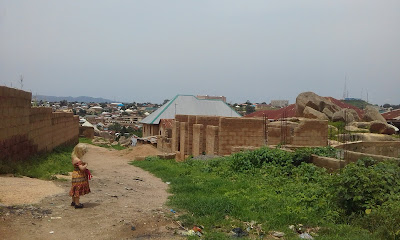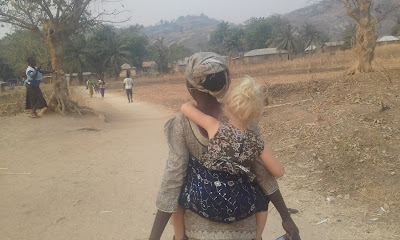“A language dies every 14 days.” This is a bold and concerning claim found
all over the internet. Why should we translate the Bible if people are no longer speaking their languages? This reflection used to bother me as a young language surveyor. It is true that languages do die for many reasons. I have even visited some communities in Nigeria where you struggle to find anyone who speaks the heritage language. But as I have dug into this statement deeper, I find that
this statement is actually totally mistaken, not based on real data, but mere guesses. So what is the truth and what does it mean for us as we translate the Bible?
 |
| Mariama overlooks a neighborhood in Jos |
In 2019, I was deeply encouraged when our international Chief Research Officer, Gary Simons shared a poster that corrected this misunderstanding. When I was about five years old, I first met Gary Simons. I was more interested in playing with his children at the time. After becoming a language surveyor, I began to appreciate not only this man’s thoughtful faith, but also his insightful analysis of data about languages. In this poster he shares the data: only about nine languages die each year—or about one every 40 days. More languages are dying in the Americas and Australia—where many of the cultures were based on a threatened “hunter gatherer” lifestyle than in Sub-Saharan Africa—where agricultural practices have made a stable environment for maintaining culture. I observed that this is also true in Nigeria—as I travel all over Nigeria I meet youth and children, participating in the agriculture-based lifestyles, and still speaking and preferring their language for many parts of their lives.
 |
| A river crossing from my survey days |
However, all over the world, as people move to cities and intermarry with people speaking different languages, many people are not passing their languages on to their children. It is hard to predict what will happen to languages in these situations. Sometimes people who have moved to cities realize the value of their heritage, and therefore work harder to stay connected—including frequent visits back to their home area. They may also support language-related work with their time and money.
 |
| Mariama visits a village where I did survey years prior |
So if a language shows a hint that some people are abandoning it, is it still good to invest in Bible translation? Although the question can get quite complex, I have come to two fairly simple conclusions. If a significant number of children and youth are still speaking the language, it is probably worth investing in longer-term investment. Also, even if most children or youth are abandoning a language, if there are some people that still speak and value their language, perhaps some smaller investments such as oral Bible stories or smaller portions of Scripture could be completed quickly enough to benefit the people still speaking the language. Even if a language is very much alive, having some verses of Scriptures available quickly can help!
 |
| Mariama and Lydia visit a village for Scripture Listening and Reading groups in 2019 |
What about developing languages that are dying with alphabets, dictionaries or recordings of their language? Often when a language is dying it reflects a significant social change for those people. Some communities are ready to let some of their heritage identity go along with their language, while others choose to value and work to preserve it. Sometimes with a little effort—recordings and words of encouragement—we can show Christ’s love by helping a group remember this gift God has given them—their identity and history.
I am grateful that Nigerian languages—and many languages around the world—are not dying as fast as some have guessed. Even when languages are dying, usually the people who speak them aren’t—and this requires great wisdom to know how to serve these people.








No comments:
Post a Comment